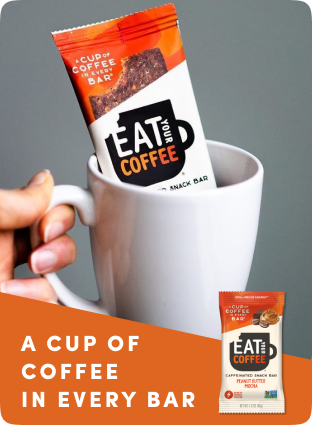For many individuals worldwide, caffeine is the quintessential fuel that jumpstarts their day. In fact, research shows that over 75% of Americans (3 in every four people) report that they consume caffeine at least once a day.
It's no secret that caffeine gets you feeling more alert and energized to kickstart your day. And that's why many people wouldn't imagine starting their daily routine without it. But what's the source of your daily caffeine hit?
Well, while a cup of coffee is a favorite for many people, others will prefer a shot of espresso. But today, we focus more on espresso. We want to know exactly how much caffeine is in a shot of espresso.
But first,
What is Caffeine?
Caffeine is a naturally-occurring stimulant found in the leaves, beans, and fruits of certain plants. It stimulates the central nervous system, allowing us to feel more alert and awake. That's why most of us can't go without that cup of coffee daily.
Usually, if you want to start your day with a jolt of caffeine, you can get it from various sources. Some may prefer a cup of coffee, tea, soda, energy drinks, guarana, chocolate, etc. However, the amount of caffeine in each drink varies.
So, depending on your caffeine preference, you have a variety of sources to choose from.
Expresso vs Regular Coffee

The amount of caffeine present in coffee or espresso drinks varies depending on several factors. For instance, the roast level of the beans, the brewing time, and the grind size. While the two drinks use the same type of beans, the said factors result in a different kind of drink.
Usually, espresso beans are roasted longer than regular coffee beans. Also, they are ground a bit more finely than coffee beans, and the preparation is also different.
Generally, espresso has a higher caffeine content than regular coffee when you compare them an ounce to an ounce. A typical shot of espresso (one ounce) contains an average of 63 mg of caffeine, while a cup of coffee (8 ounces) contains around 92mg of caffeine.
You should also note that the faster you consume your caffeine, the faster you will notice its effects. As such, a shot of expresso feels more effective than a cup of coffee. Why? It's quicker to drink an ounce of espresso than a cup of coffee.
Lastly, the caffeine concentration in your drink will be affected by several other factors, including the type of coffee beans, the grind size, and even the brewing temperature.
How Much Caffeine in Double Shot Espresso?
The exact amount of caffeine in your drink also varies depending on the size and strength of your drink. Usually, one shot of espresso contains between 45 mg and 75 mg of caffeine, depending on the earlier-mentioned factors. But on average, most shots will have around 63 mg of caffeine.
As such, if you order a double shot of espresso, you might get around 126 mg of caffeine. Also, if you opt for a stronger blend or roast level of espresso than usual, then the caffeine content will also be higher.
So, the amount of caffeine in your espresso shot will depend entirely on what you order.
As a rule of thumb, always remember to monitor your caffeine intake to prevent any adverse effects that may come with it. Caffeine is great for energizing you and getting through the day, but too much can also be bad.
How Much Caffeine in 3 Shots of Espresso?
If you order three shots of espresso, you can expect about 189 mg of caffeine. Again, this will depend on the roast level and blend of beans used to make your espresso.
For reference, according to Healthline, healthy adult should limit their daily caffeine intake to 600 mg per day. Anything more than this might have adverse effects on your health.
How Much Caffeine in 4 Shots of Espresso?
If a shot of espresso contains around 63 mg of caffeine, on average, it means that four shots will have around 250 mg. This is subject to variation depending on the type of beans used, the roasting procedure, as well as the grind size.
It is important to note that the caffeine content of your espresso can also vary depending on the brewing procedure. A few seconds' difference could mean a slight change in the caffeine content of your beverage.
How many mg of Caffeine is in a Cup of Coffee?

Coffee is among the biggest dietary caffeine sources, with many people taking a cup or more daily. And the amount of caffeine in a cup of coffee will vary.
Usually, an average cup of coffee (around 8 ounces) will have 90 to 95mg of caffeine on average. However, this can vary depending on the size of the cup. For instance, if you order a 16-ounce coffee cup, it may contain between 95 and 400mg. Also, a 24-ounce cup will have even more caffeine, even over 500 mg. Therefore, it's safe to say that the size of your coffee serving will determine the amount of caffeine you consume.
There are also other factors that influence the amount of caffeine in a cup of coffee, including:
-
The type of coffee beans
If you didn't know, there are several types of coffee beans used to produce the coffee you drink. These beans contain different caffeine content, meaning that different coffee brands will also have different caffeine amounts.
-
Roasting Levels
Usually, the darker the roast of your coffee beans, the lesser the caffeine content. It's because caffeine is broken down during roasting, meaning that it will be lesser in a darker roast than in a light one.
-
Brewing Method
The brewing method also influences caffeine levels in coffee. For instance, cold brews and espresso shots have higher caffeine levels compared to regular drip coffee. Also, the brewing time and temperature will affect how much caffeine you get in your cup.
-
Grind Size
Finally, the grind size of your beans also influences caffeine levels in a cup of coffee. Usually, finer grounds result in higher levels of caffeine because they have more surface area exposed to hot water. That's why an ounce of espresso is more caffeinated than an ounce of regular coffee.
Number of Espresso Shots in a Latte?
Are you wondering how many espresso shots a latte drink contains? Well, depending on the size of the serving, a latte will contain two to three espresso shots.
Now, how much caffeine is in a latte drink? Between 126 mg and 190 mg of caffeine on average.
So, if your favorite beverage is a latte, you probably take three shots of espresso in every cup, with up to 190 mg of caffeine.
Number of Espresso Shots in a Cappuccino?
A cappuccino is one of the most popular espresso-based coffee drinks. On average, a cappuccino contains two shots of espresso as the base. However, as highlighted several, this may vary depending on the size of your serving and other factors.
Therefore, you can expect around 126 mg to 189 mg of caffeine in a single cappuccino. Besides the espresso shots, a cappuccino is made up of steamed milk and foam.
Do Espresso Beans Have Caffeine?
Yes, espresso beans do contain caffeine. In fact, all coffee beans contain caffeine.
However, the amount of caffeine in the beans will vary based on the factors explained earlier.
Even decaffeinated espresso beans are made from the same coffee beans. It's just that they pass through a process that removes most of the caffeine before they are roasted.
Is Espresso Stronger than Coffee?
I know this will most probably be your next question. So, yes! On average, espresso is high in caffeine compared to regular coffee.
Although the exact amounts may vary depending on several factors, a single shot of espresso contains around 63 mg of caffeine on average.
Therefore, if you are looking for an energy boost that lasts longer than a cup of regular coffee, then espresso should be your go-to choice.
Is 150 mg of Caffeine A Lot?
Not really. According to the USDA (United States Department of Agriculture), it's safe to consume around 400 mg of caffeine per day.
Therefore, 150 mg of caffeine is considered to be a moderate amount. This means that it won't bring any significant harm to your body.
However, if you have any underlying medical conditions or are pregnant, it's prudent to consult your doctor before consuming any caffeinated beverages.
How much Caffeine is in Decaf Espresso?

Decaf Espresso is processed from decaffeinated Espresso beans. This means that most of the caffeine (97%) is removed from the beans.
Usually, USDA requires that decaffeinated coffee drinks contain a maximum of 0.10% of caffeine. However, studies show that a cup of decaffeinated espresso contains around 3-15.8mg per ounce, while an 8-ounce cup of decaf coffee contains around 7mg.
Here is a list of how much caffeine the different espresso servings contain:
- A single shot of espresso: 29 to 100mg
- Double-shot espresso: 58 to 185mg
- A single shot of decaf espresso: 8 mg per ounce
- Double-shot decaf espresso: 16mg
Now, if you want a decaffeinated drink, you know where to look.
How is Decaf Espresso Made?
Decaffeinated coffee is produced using either chemical solvents or natural water processes.
In the chemical solvent method, coffee beans are soaked in a solution of methylene chloride or ethyl acetate to remove the caffeine. They are then washed with hot water and dried to make decaf espresso. The chemicals are not found in the end product because they readily evaporate after use.
On the other hand, the natural water process involves soaking coffee beans in hot water to extract the caffeine. The resulting liquid is then filtered through activated charcoal or carbon dioxide filters to remove the caffeine. The caffeine-infused liquid is then recycled back into green coffee beans with minimal loss of flavor.
Finally, the decaffeinated espresso beans are then dried and roasted to be used for making espresso drinks.
Other Excellent Sources of Caffeine
A cup of coffee or expresso are not the only ways to get yourself energized with caffeine. There are other incredible ways that might fit you even better. For instance, have you ever thought of Eat Your Coffee caffeinated energy bars? Well, if you haven't, you certainly should.
What are these Eat Your Coffee energy bars?
These are vegan and gluten-free energy bars made with real coffee beans that provide an energizing boost of caffeine.
With 200mg of caffeine per bar, these are certainly more convenient alternatives to coffee or espresso. So, if you're looking for a healthier alternative to your morning cup of joe, Eat Your Coffee energy bars should be right up your alley.
Why Eat Your Coffee Caffeinated Energy Bars?
I know you wouldn't want to forego that morning espresso shot for anything else. But what if you knew something else that would give you the same satisfaction or even more?
Here are the main reasons you should consider Eat Your Coffee energy bars:
1. More Focus and Alertness
These caffeinated coffee bars offer you the perfect combination of caffeine and essential nutrients that help to keep you energized and focused throughout the day.
They also contain calcium, iron, and potassium, which are all beneficial for your overall health. Plus, they taste amazing!
2. Convenient Snack
These bars are convenient to carry around and have when you're on the go. No matter how busy your day is, you can have an energizing snack that doesn't require any preparation or mess.
3. No Crash
Unlike coffee or espresso, Eat Your Coffee bars don't give you the dreaded caffeine crash. You can enjoy sustained energy throughout the day without any feelings of fatigue or exhaustion.
4. Gluten-free and Vegan
These bars come in gluten-free and vegan-friendly options. This means that you can enjoy your favorite snack without any guilt or worry.
5. Delicious Flavors
Who doesn't love variety? These caffeinated snacks offer just that. They come in mouthwatering flavors such as Fudgy Mocha Latte, Cocoa Espresso, and Salted Caramel Macchiato, which are sure to satisfy your cravings.
6. Ideal when Planning a Trip
These bars are lightweight, compact, and don't require refrigeration. This makes them ideal for packing for any trip. Whether it's a short road trip or a long flight, these energy bars will keep you energized the whole way.
You can keep some in your backpack or car for those days when your energy is running low. Even better, any time of the day when you need a snack.
7. Helps you Avoid Accidents
It's no secret that driving can be a dangerous activity. But when you're feeling tired or fatigued, it becomes even more risky.
Having Eat Your Coffee energy bars will help you to stay alert and focused on the road. This way, you can avoid any potential accidents caused by fatigue or distraction. Always arrive safely!
8. Ideal to Fuel your Workout
Caffeine boosts your energy. This makes it perfect for pre-workout snacks, providing you with the energy to power through your workout session and achieve better results.
And did you know that it can also help improve muscle recovery post-sweat? That's right. This means that your body needs it both during and after your workout.
Have a snack or two in your gym bag for such occasions. And to try out our FREE sample pack, use the Discount code TRY.
FAQs
How much caffeine is in an 8 oz coffee cup?
An 8 oz cup of coffee typically contains about 95 mg of caffeine. However, this may vary depending on the type of coffee and the amount of coffee served. The type of coffee beans also influences the caffeine content.
How much caffeine is in one shot of espresso?
A single shot of espresso typically contains about 63 mg of caffeine. However, the amount may vary depending on the coffee beans used and the size espresso served. For instance, a double shot contains more caffeine than a single espresso shot.
How much caffeine is in one Eat Your Coffee energy bar?
Each Eat Your Coffee energy bar contains approximately 65 mg of caffeine. That is equal to a shot of expresso which also contains around 63 mg of caffeine. Therefore, eating a single bar equate to having a shot of espresso.
What amount of caffeine is too much?
Generally, it is recommended that a healthy adult should not consume more than 400 mg of caffeine per day. However, this varies from person to person, and some people may have higher tolerances. Exceeding 600mg of caffeine daily will, however, be considered excessive and will have adverse effects on your health.
Also, pregnant women should limit their daily caffeine intake to less than 200 mg.
Are Eat Your Coffee energy bars safe for diabetics?
Yes, these bars are suitable for diabetics as the sugar content is low, and they contain no artificial sweeteners. The natural sugars found in these bars come from ingredients such as dates, cocoa nibs, and almonds.




